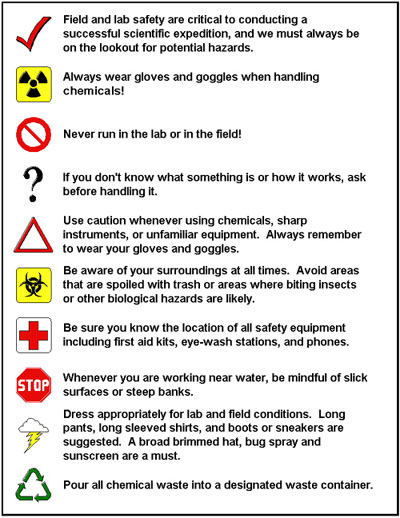SAFETY
Field and lab safety are critical to conducting a successful scientific expedition and we must always be on the lookout for potential hazards.
FIELD SAFETY
- Before leaving for the field, be sure to include a first aid kit in your field supplies and know the location of the nearest medical facility. It is a good idea to keep a portable phone with you (if available) in case of emergency. If you will be using chemicals in the field, make sure you pack gloves and goggles to protect your skin and eyes.
- Dress appropriately for the field. It is always a good idea to wear long pants, long-sleeved shirts, and boots or sneakers when going to the field. A broad brimmed hat will help protect you from the sun. Bug spray and sunscreen are a must.
- Be aware of your surroundings at all times. Avoid areas that are spoiled with trash; broken glass, sharp metal, or other hazards may be present. Also avoid thick brush and tall grass where biting insects or other biological hazards (e.g. poison ivy) are likely.
- Whenever you are working near water, be mindful of slick surfaces or steep banks. Never run along the bank or on a dock! Floatation aids (e.g. life jackets) are a good idea. Also keep an eye out for dangerous animals. Alligators, snakes, crabs, and even oysters can cause serious injuries.
- If using chemicals in the field, bring an appropriate container for any waste. All waste should be properly disposed of after returning from the field.
LAB SAFETY
Safety in the lab is just as important as in the field. Make sure your lab is equipped with a first aid kit and a source of running water for washing chemicals from skin or eyes. An eyewash bottle (or eyewash station) and safety shower are the best means of keeping safe around chemicals. Be sure you know the location of all safety equipment.
- Never run in the lab!
- Always wear goggles and gloves when handling chemicals.
- If you don’t know what something is or how it works, ask before handling it.
- Use caution and common sense whenever using chemicals, sharp instruments, or unfamiliar equipment.
CHEMICAL SAFETY
- Always wear gloves and goggles when handling chemicals!
- Use extreme caution when pouring or measuring chemicals to avoid spills. Avoid using powdered chemicals under windy conditions (outside or near an open window).
- Pour all chemical waste into a designated waste container, even in the lab. Dispose of the waste properly according to manufacturers’ instructions and local laws.
- The chemicals used in the dissolved oxygen measurement are designed to be poured down the sink with lots of water. Remember, sinks are connected to sewage treatment facilities that can handle such chemicals in small quantities. Storm drains and other sewers dump directly into the bayou. Never put wastes into the storm drain.

